
Decisions in Economics and Finance
metrics 2024
Transforming Ideas into Impactful Financial Strategies
Introduction
Decisions in Economics and Finance, published by SPRINGER INT PUBL AG, is a leading journal in the fields of economics, econometrics, and finance, providing a critical platform for researchers, professionals, and students to disseminate their findings and insights. With an impressive impact factor positioned in the Q2 category for both Economics and Finance in 2023, this journal is recognized for its rigorous peer-reviewed process and impactful research contributions. The journal spans over areas of general economics and finance, emphasized by its Scopus rankings, which place it in the 68th and 50th percentiles respectively. Since its inception in 1997 and continuing through its conferred years, Decisions in Economics and Finance continues to foster innovative approaches to economic and financial decision-making while bridging theoretical and practical applications. While it currently does not offer Open Access options, its commitment to quality research and interdisciplinary collaboration makes it a vital resource for anyone engaged in these dynamic fields.
Metrics 2024
 0.46
0.46 1.40
1.40 1.10
1.10 16
16Metrics History
Rank 2024
Scopus
IF (Web Of Science)
JCI (Web Of Science)
Quartile History
Similar Journals

Mathematics and Financial Economics
Pioneering Research in Quantitative Finance and EconomicsMathematics and Financial Economics, published by Springer Heidelberg, is a leading peer-reviewed journal that explores the intersections of mathematical theories and financial practices. With an ISSN of 1862-9679 and an E-ISSN of 1862-9660, the journal has made notable contributions to its field since its inception in 2007, with a convergence period extending until 2024. Positioned in the prestigious Q2 category for both Finance and Statistics and Probability, the journal is ranked within the top 66th percentile in Mathematics and Statistics and the 62nd percentile in Decision Sciences according to Scopus metrics. Researchers and professionals looking for high-quality, innovative research in mathematical finance will find valuable insights within its pages. Although primarily a subscription-based journal, it aims to foster knowledge sharing among academia and industry experts. Its commitment to advancing quantitative methods and financial applications solidifies its importance as a resource for students, researchers, and practitioners dedicated to understanding and navigating the complex dynamics of financial markets.
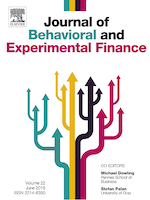
Journal of Behavioral and Experimental Finance
Exploring the Psychology Behind Financial ChoicesJournal of Behavioral and Experimental Finance, published by Elsevier, stands as a premier outlet for groundbreaking research in the realm of finance, particularly focusing on the psychological and behavioral factors that influence financial decision-making. With an ISSN of 2214-6350 and an E-ISSN of 2214-6369, this journal has established itself within the top tier, achieving a Q1 ranking in Finance for 2023, and is currently positioned 10th out of 317 journals in the Scopus category of Economics, Econometrics and Finance, demonstrating a remarkable 97th percentile ranking. Aiming to bridge theoretical advancements with practical applications, the journal encourages submissions that explore innovative methodologies and empirical studies, offering valuable insights for academics, practitioners, and students alike. As a vital resource for those interested in the confluence of psychology and finance, the Journal of Behavioral and Experimental Finance is pivotal in shaping the future of financial research and practice.
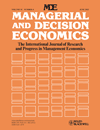
MANAGERIAL AND DECISION ECONOMICS
Transforming Research into Actionable Management SolutionsMANAGERIAL AND DECISION ECONOMICS is a highly regarded academic journal published by John Wiley & Sons Ltd that serves as a vital resource in the field of business and management. With an ISSN of 0143-6570 and an E-ISSN of 1099-1468, this journal has established itself as a prominent platform for disseminating cutting-edge research from its inception in 1980 through to 2024. Currently ranked in the Q2 category across multiple fields—including Business and International Management, Management of Technology and Innovation, Management Science and Operations Research, and Strategy and Management—it highlights significant contributions within these domains. The journal is based in the United Kingdom and contributes to the ongoing dialogue and development of innovative managerial practices driven by empirical decision-making research. Although the journal does not offer open access, it remains highly influential, with noteworthy Scopus rankings showing its strong impact within the scholarly community. Researchers, professionals, and students alike will find valuable insights and advancements in management science that inform and enrich their practices and academic pursuits.
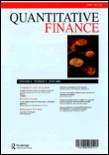
QUANTITATIVE FINANCE
Exploring innovative solutions in finance and econometrics.QUANTITATIVE FINANCE, published by Routledge Journals, Taylor & Francis Ltd, stands at the forefront of academic research in the dynamic fields of finance, economics, and econometrics. With a strong commitment to disseminating cutting-edge research, this esteemed journal, which has been published since 2001 and continues to thrive with an anticipated convergence until 2024, occupies a prestigious Q1 ranking in Economics, Econometrics, and Finance and a Q2 ranking in Finance as of 2023. It serves as an essential platform for interdisciplinary studies, aiming to bridge theoretical approaches and practical applications in quantitative methods. Researchers, professionals, and students are provided access to a wealth of high-quality articles that contribute to the ongoing discourse and advancements in these fields. As the journal continues to impact its community, QUANTITATIVE FINANCE remains an invaluable resource for those seeking to stay at the cutting edge of financial research and its applications globally.

THEORY AND DECISION
Innovating Research, Shaping Decisions Across DisciplinesTHEORY AND DECISION is a prestigious academic journal published by SPRINGER, which has been a cornerstone of interdisciplinary research since its inception in 1970. With an ISSN of 0040-5833 and an E-ISSN of 1573-7187, this journal offers valuable insights into a range of fields, including Applied Psychology, Decision Sciences, Economics, and more. Holding a remarkable position within various quartile rankings, such as Q1 in Arts and Humanities and Q2 in Economics, it signifies the journal's impact and relevance in modern academic discourse. Although not presently open access, it remains accessible to researchers and institutions that prioritize impactful studies and theoretical advancements. The journal's objectives include exploring decision-making processes and theoretical underpinnings that inform practical applications across disciplines, making it an essential resource for academics, professionals, and students dedicated to advancing knowledge in their respective fields. THEORY AND DECISION continues to shape the landscape of interdisciplinary research, providing a platform for innovative ideas and discussions that are crucial in today’s complex world.
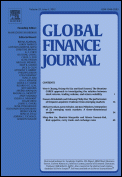
Global Finance Journal
Elevating discourse in finance and economics.Global Finance Journal is an esteemed periodical published by Elsevier, dedicated to the dynamic fields of finance and economics. With an impressive history spanning from 1989 to 2024, this journal holds a significant position in the academic community, boasting a Q1 quartile ranking in both Economics and Econometrics, as well as Finance, as of 2023. It is highly regarded in Scopus rankings, placing 40th out of 317 in Finance and 99th out of 716 in Economics and Econometrics, demonstrating its influence and reach among researchers and practitioners alike. Although not an open-access journal, the Global Finance Journal provides rigorous peer-reviewed articles that explore critical issues, advance theoretical frameworks, and address practical applications in global finance. As such, it serves as a vital resource for researchers, financial professionals, and students aiming to deepen their understanding of economic phenomena and contribute to the ongoing discourse in these vibrant disciplines.

JOURNAL OF PORTFOLIO MANAGEMENT
Empowering Finance Professionals with Rigorous ResearchJOURNAL OF PORTFOLIO MANAGEMENT is a premier academic journal dedicated to advancing the field of finance through rigorous research focused on investments, asset management, and portfolio strategies. Published by PAGEANT MEDIA LTD in the United States, this journal has established itself as a vital resource for finance professionals and scholars alike, as evidenced by its consistent ranking in the Q2 category across disciplines such as Accounting, Business Management, Economics, and Finance according to the latest categorization. With an emphasis on empirical studies and theoretical advancements since its inception in 1995, the journal remains a key player in the academic landscape, offering insights valuable for both researchers and practitioners. Although not an open-access journal, it provides access to high-quality, peer-reviewed articles that contribute significantly to the discourse on portfolio management. The ISSN for traditional publications is 0095-4918, while the E-ISSN is 2168-8656, ensuring wide-reaching dissemination of complex financial concepts. Immerse yourself in the latest findings to enhance your understanding and application of portfolio management strategies.
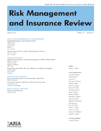
RISK MANAGEMENT AND INSURANCE REVIEW
Elevating Discourse in Risk Management and Financial ResilienceRISK MANAGEMENT AND INSURANCE REVIEW, published by Wiley, is a vital journal for researchers and practitioners in the fields of accounting, economics, and finance. With an ISSN of 1098-1616 and an E-ISSN of 1540-6296, this journal serves as a comprehensive platform for the dissemination of cutting-edge research and insights into risk management and insurance practices. Although it does not offer an open-access model, it is recognized for its rigorous peer-review process and maintains an impactful presence within the academic community, reflected in its 2023 Scopus rankings in various disciplines, including its Q3 quartile status across multiple categories. The journal's scope addresses key contemporary issues in risk assessment, financial stability, and insurance innovation, contributing significantly to the evolving discourse in these areas. As it converges from 2006 to 2024, RISK MANAGEMENT AND INSURANCE REVIEW continues to attract a diverse readership, providing valuable resources and fostering dialogue among students, professionals, and established researchers alike.
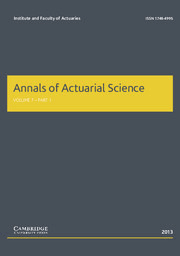
Annals of Actuarial Science
Exploring innovative insights in economics and statistics.Annals of Actuarial Science, published by Cambridge University Press, stands as a prominent academic journal in the fields of economics, statistics, and actuarial science. With an ISSN of 1748-4995, it features rigorous research aimed at advancing knowledge and practice in areas related to risk management, data analysis, and probability. The journal is recognized for its significant impact, holding a Q2 category ranking in both Economics and Econometrics and Statistics and Probability, along with notable positioning within Scopus rankings. Although it does not currently offer open access, its comprehensive selection of scholarly articles from 2010 to 2024 remains invaluable to researchers, professionals, and students alike, providing insights that drive the actuarial profession and enhance decision-making processes across various sectors. Positioned at the intersection of theoretical innovation and practical application, the Annals of Actuarial Science continues to shape the discourse and development of its disciplines.
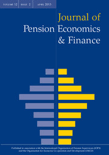
Journal of Pension Economics & Finance
Advancing Knowledge for Sustainable Retirement SolutionsJournal of Pension Economics & Finance, published by Cambridge University Press, is a pivotal resource for scholars and professionals immersed in the intricacies of pension systems, investment strategies, and the economic forces shaping financial security in retirement. Established in 2002, this esteemed journal focuses on cutting-edge research and theoretical insights that intersect the fields of Economics, Finance, and Organizational Behavior, boasting a commendable Impact Factor reflected in its Q2 ranking across multiple categories in 2023. With a diverse range of articles that inform both policy and practice, the journal serves as an essential platform for disseminating knowledge and fostering discussions that advance the understanding of pension economics and finance through rigorous analysis. Contributions are indexed in prominent databases, enhancing visibility and accessibility for interested researchers and practitioners in the global community. As such, the Journal of Pension Economics & Finance is a must-read for anyone dedicated to tackling the financial challenges and opportunities that prevail in pension management today.